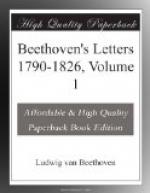Under these circumstances I have recourse to a shorter path, in the conviction that the guardians of the Prince’s estate will be disposed to mark their appreciation of art, and also their desire to fulfil the engagements of the late Prince. According to the terms of the contract in question, the Archduke Rudolph, Prince Lobkowitz, and Prince v. Kinsky granted me these 4000 florins until I should obtain a situation of equal value; and further, if by misfortune or old age I was prevented exercising my art, these distinguished contracting parties secured this pension to me for life, while I, in return, pledged myself not to leave Vienna.
This promise was generous, and equally generous was its fulfilment, for no difficulty ever occurred, and I was in the peaceful enjoyment of my pension till the Imperial Finance Patent appeared. The consequent alteration in the currency made no difference in the payments of the Archduke Rudolph, for I received his share in Einloesung Schein, as I had previously done in bank-notes, without any reference to the new scale. The late illustrious Prince v. Kinsky also at once assured me that his share (1800 florins) should also be paid in Einloesung Schein. As however, he omitted giving the order to his cashier, difficulties arose on the subject. Although my circumstances are not brilliant, I would not have ventured to bring this claim before the notice of the guardians of the estate, if respectable, upright men had not received the same pledge from the late Prince’s own lips, namely, that he would pay my past as well as my future claims in Vienna currency, which is proved by the papers B, C, D, appended to the pleas. Under these circumstances I leave the guardians to judge whether, after so implicitly relying on the promise of the deceased Prince, I have not cause to complain of my delicacy being wounded by the objection advanced by the curators to the witnesses, from their not having been present together at the time the promise was made, which is most distressing to my feelings.
In order to extricate myself from this most disagreeable lawsuit, I take the liberty to give an assurance to the guardians that I am prepared, both as to the past and the future, to be satisfied with the 1800 florins, Vienna currency; and I flatter myself that these gentlemen will admit that I on my part make thus no small sacrifice, as it was solely from my esteem for those illustrious Princes that I selected Vienna for my settled abode, at a time when the most advantageous offers were made to me elsewhere.
I therefore request the Court to submit this proposal to the guardians of the Kinsky estates for their opinion, and to be so good as to inform me of the result.
L. V. BEETHOVEN.
[Footnote 1: See No. 94. On the 18th January, 1815, the Court of Justice at Prague decreed that the trustees of Prince Kinsky’s estate should pay to L. v. Beethoven the sum of 1200 florins W.W. from November 3d, 1812, instead of the original written agreement of 1800 florins. Dr. Constant, of Wurzbach, in his Biographical Austrian Lexicon, states that Beethoven dedicated his splendid song An die Hoffnung, Op. 94, to Princess Kinsky, wife of Prince Ferdinand Kinsky, who died in 1812.]




